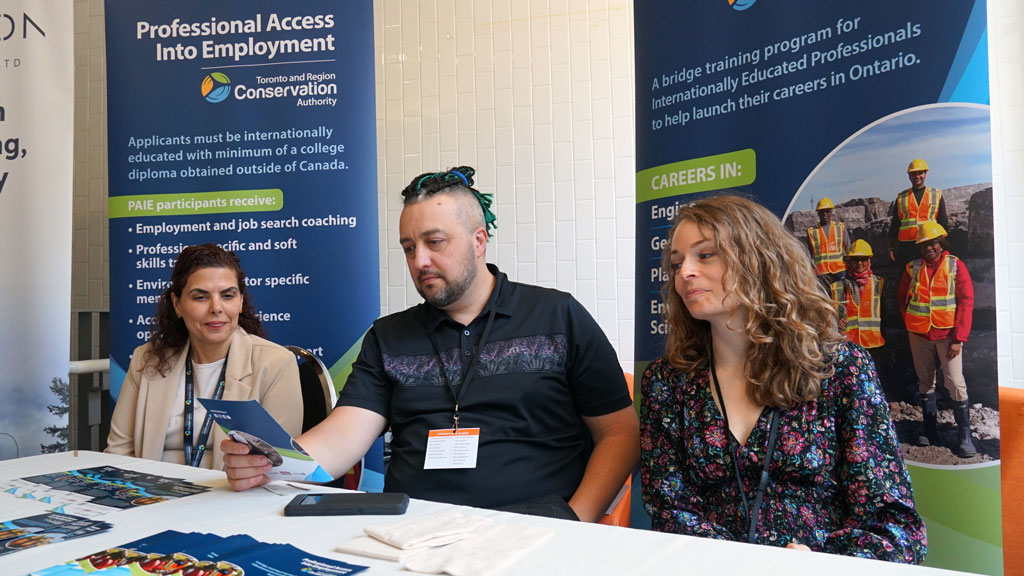An employment bridging program for newcomers with experience in an environmental profession is chalking up success stories in Ontario.
Operating through the educational division of the Toronto and Region Conservation Authority (TRCA), the Professional Access Into Employment (PAIE) program has helped numerous immigrants and refugees relaunch their careers in Ontario in fields ranging from engineering and geoscience to environmental science and urban planning.
“It is designed for environmental (professions) which you won’t find anywhere else,” says Antonina D’Urzo, one of the program’s six co-ordinators.
“It really makes us so unique.”
D’Urzo and colleagues Lisa Der and Peter Dudka were part of a team from the TRCA hosting an information booth on PAIE at the annual Canadian Brownfields Network conference at Toronto Metropolitan University.
PAIE’s nine-month curriculum covers job search techniques and corporate culture dynamics to help participants understand the job market and develop their resumes, Der says.
Along with getting an education in social media and the culture of networking, participants are put through 130 hours of profession-specific training from TRCA staff or external organizations, depending on their profession.
Participants in planning professions might be walked through the process of an official plan with the guidance of the TRCA’s planning team. Others get hands-on experience in environmental site assessments.
Training includes time on the tools of the profession such as AutoCAD, says Der.
Each participant has a mentor “to support them in their journeys,” she says, pointing out participants face barriers that few of their Canadian counterparts do.
Many refugees and refugee claimants, for example, have resume gaps because of wars or other circumstances that made it difficult to continue their careers in their countries, says Der.
The lack of proficiency in English or profession-specific language can also be obstacles to landing good jobs, she adds.
Many learn quickly their work experience doesn’t count for much in Canada, Der says.
Dudka points to a civil engineer from Jamaica as an example. He had soil remediation experience but could not find work in his field after seven years.
“He was on the verge of despair” when he signed up for the PAIE program.
As he moved through the courses, his self-esteem rose. He landed a 12-month internship, got a full-time job and obtained his professional engineers of Ontario licence, Dudka says.
“I can say, ‘We changed his life.’”
More than 550 newcomers ranging in age of late 20s to over 60 have gone through the bridging program since its inception in 2006.
“They are our biggest asset because most of the alumni mentor our new clients or come to us to hire someone or deliver a professional class which is done for free,” he says.
This year’s class has 59 participants.
Dudka says over the past two years urban planners from countries such as Iran, Turkey and India have represented the lion’s share of participants.
The number of water resource engineers from overseas is also notable, he says.
One of the reasons the conservation authority started the program 18 years ago was that many newcomers came to its doors looking for volunteer opportunities, Der points out.
She says Ontario is experiencing an engineering shortage, partly resulting from an aging workforce.
“There is going to be a skills gap and we know there are lots of infrastructure projects coming up or underway,” she says, pointing to the ONxpress Go Expansion program to electrify the rail system in the Greater Toronto and Hamilton regions as a project that will need many engineering professionals.
Open to people without a degree from a Canadian post-secondary institute in their field, the PAIE program is funded by the province’s Ministry of Labour, Immigration, Training and Skills Development.









As a PAIE alumni, I’m very happy to read such article and see the program being recognized and still helping so many newcomers as I was.
Being a newcomer is already a challenge by itself, and most of us arrive in Canada without proper knowledge of the job market or specific trainings required to find a good job in our field. By covering different trainings and job search techniques, we get a strong support which helps us fill out a gap for not having Canadian experience. The program get us better prepared and confident when opportunities of interviews arise. Our coordinators were available at any time for assisting on interview practicing, resume tailoring and connecting us to other people who could also mentor or assist us.
It was through the PAIE program connections that I had the opportunity to have my first interview in Canada, from which I was selected for an internship at TRCA, where I still currently work and have become a full time employee.
Great article on recognising PAIE program’s success in shaping the lives of so many Newcomers over the years. I attended the program from March to November, 2022. The well-structured curriculum and flexible format of PAIE makes it comprehensive and one of a kind bridging program. Firstly, the ‘Job Search and Corporate Culture’ (JSCC) training provides an overview of the expectations that the Canadian job market has from an job applicant and guides a Newcomer in projecting and/or transferring their past knowledge, experiences and skills to meet these expectations. Secondly, the wide range of professional trainings offered by PAIE provides advanced skills and knowledge relevant to the Canadian job market and gives a Newcomer the opportunity to expand their professional network by connecting them to various resource professionals working in the field. Thirdly and most importantly the allotment of a Coordinator for every PAIE participant provides for a great support system throughout the job search process. The Coordinators not only arrange mentorship meetings and informational interviews but provide constant guidance and motivation in navigating each and every job application and interview proceeding while assisting with areas of improvement.
A 9 months program may seem like a long commitment to many Newcomers, however, the primarily online format, off-work timings and self-paced modules (particularly, JSCC) makes the program flexible and well-suited for Newcomers. In short, I would certainly recommend enrolling to the program to all Newcomers having a background in environment or its intersecting fields.